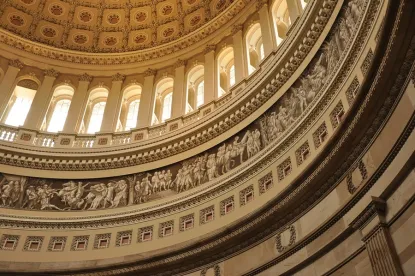The US Congress is moving urgently to formulate new legislation that goes to the heart of the current policy debate in America, and it has nothing to do with coronavirus. Instead, the focus of Congress’ current short-term agenda is police reform, calls for which have surged across the nation in the wake of the universally condemned killing of George Floyd. With last Friday’s national jobs report indicating that overall unemployment is shrinking as states and territories reopen and the trillions of dollars in new spending provided by the March 27 CARES Act cycle through the economy, it is less likely than ever that bipartisan talks to craft the next major federal COVID-19 response package will commence anytime soon.
Topics covered today include: tax and economic development, health, European policy, government oversight and developments at the US state level.
The evolution of Washington’s pandemic response timetable illustrates the degree to which the policy landscape has shifted since mid-May. House Speaker Nancy Pelosi (D-CA) pushed the US$3 trillion HEROES Act through the House on the strength of Democratic votes as an intended sequel to CARES. Following House passage of HEROES, Senate Minority Leader Chuck Schumer (D-NY) and Democratic Policy and Communications Chairwoman Debbie Stabenow (D-MI) announced the launch of a public relations blitz intended to put pressure on Senate Majority Leader Mitch McConnell (R-KY) and his Republican colleagues to act swiftly on the measure or come to the table to negotiate a consensus package. But congressional Republicans dug in, insisting that the original measure should be given additional time to work. The Democratic drive for quick passage of the next package has subsequently been overtaken by a series of national developments that have pushed COVID-19 off the front pages in some markets, emboldening GOP legislators in their quest to forestall the next round of coronavirus response talks.
More via POLITICO’s Burgess Everett and Marianne LeVine:
Buoyed by a surprisingly strong jobs report last week and the knowledge that some of Congress’ [$US2.7 trillion] March spending package still hasn’t been spent, the Senate GOP remains noncommittal on the timing and substance of the next piece of legislation. Bipartisan talks still haven’t begun in earnest, according to senators and aides, and the White House and senior Republican senators say they won’t start until July.
The economy has ‘bottomed out’ said Senate Majority Leader Mitch McConnell in a floor speech as he touted improving jobs numbers. He declined to answer a reporter’s question about timing for new aid. But if the Senate waits until next month to act, the window gets smaller. After July 3, the Senate is scheduled to go on a two-week recess, return for three weeks and then depart again until September.
Republicans say it’s only responsible to wait and see how nearly [$US3 trillion] in total coronavirus spending seeps into the economy. But it’s also a gamble: if the economic recovery isn’t as strong as they predict, they risk being blamed by voters in November that they and President Donald Trump didn’t do enough amid a global pandemic and historic recession.”
The US economy is officially in recession, the National Bureau of Economic Research (NBER) announced Monday. “The recession declaration ended the 128-month economic expansion that began in June 2009, which eclipsed the 1990s recovery as the longest on record,” reports Yahoo Finance.
Tax and Economic Development Updates
In addition to a report by the Congressional Budget Office (CBO) showing declining receipts (US$175 billion in May 2020 compared to US$232 billion in May 2019) and increasing outlays (US$598 billion in May 2020 compared to US$440 billion in May 2019), the NBER yesterday officially designated the United States as having entered into a recession. We expect to learn more about projections for US economic growth, inflation and unemployment rates this week following a number of Federal Reserve policy meetings, which are likely to help shape the debate over the ongoing federal response to the economic downturn stemming from COVID-19. As pertains to the issue of unemployment, specifically, the Senate Committee on Finance today will hold a hearing featuring Labor Secretary Eugene Scalia to discuss the expanded unemployment benefits (US$600 per week through the end of July) made available through the CARES Act. While Democrats are generally in favor of extending these expanded unemployment benefits through the end of the year, Senate Republicans have previously suggested that this is a “red line” they are unwilling to cross. Instead, proposals like the one from Committee Member Rob Portman (R-OH) that provide a US$450 per week “return to work bonus” appear to be their preferred approach and may gain further momentum with unemployment numbers expected to drop in the coming weeks as the US economy continues to reopen. According to Senator Portman, “[g]iven that more than 15 million unemployed Americans are categorized as ‘temporary layoffs,’ we need to be sure that there’s no financial disincentive for these individuals to get back into the workforce when those jobs become available to them again.”
As reported yesterday, we also expect to learn more about the Federal Reserve’s Main Street Lending Program (MSLP) this week. Notably, yesterday, the Federal Reserve announced an expansion of the MSLP to allow more small and mid-sized businesses to be eligible for financial support. Specifically, the Federal Reserve lowered the minimum loan amount (US$250,000 down from US$500,000), raised the maximum loan limit for each of the three loan types, adjusted the principal repayment schedule to begin after two years instead of one and extended the loan term to five years up from four years. Additionally, banks will now be required to hold 5% of the loans on their balance sheets for all three facilities; previously they were required to hold 15% of loans to riskier businesses. According to Federal Reserve Chairman Jerome Powell, “[s]upporting small and mid-sized businesses so they are ready to reopen and rehire workers will help foster a broad-based economic recovery…[and] I am confident the changes we are making will improve the ability of the Main Street Lending Program to support employment during this difficult period.” The Federal Reserve continues to suggest the MSLP will be open for eligible lenders “soon.”
Small Business Administration (SBA) Administrator Jovita Carranza and Treasury Secretary Steven Mnuchin yesterday issued a joint statement praising enactment of the Paycheck Protection Program Flexibility Act, suggesting that it “will provide businesses with more time and flexibility to keep their employees on the payroll and ensure their continued operations as we safely reopen our country.” Notably, SBA and the Treasury Department also provided a detailed overview of upcoming procedures, noting that the regulators “will promptly issue rules and guidance, a modified borrower application form, and a modified loan forgiveness application implementing these legislative amendments” to the Paycheck Protection Program (PPP), including to:
-
Extend the covered period for loan forgiveness from eight weeks after the date of loan disbursement to 24 weeks after the date of loan disbursement. Borrowers who have already received PPP loans retain the option to use an eight-week covered period.
-
Lower the requirements that 75% of a borrower’s loan proceeds must be used for payroll costs and that 75% of the loan forgiveness amount must have been spent on payroll costs during the 24-week loan forgiveness covered period to 60% for each of these requirements. If a borrower uses less than 60% of the loan amount for payroll costs during the forgiveness covered period, the borrower will continue to be eligible for partial loan forgiveness, subject to at least 60% of the loan forgiveness amount having been used for payroll costs.
-
Provide a safe harbor from reductions in loan forgiveness based on reductions in full-time equivalent employees for borrowers that are unable to return to the same level of business activity the business was operating at before February 15, 2020, due to compliance with requirements or guidance issued between March 1, 2020 and December 31, 2020 by the Secretary of Health and Human Services, the Director of the Centers for Disease Control and Prevention or the Occupational Safety and Health Administration (OSHA), related to worker or customer safety requirements related to COVID–19.
-
Provide a safe harbor from reductions in loan forgiveness based on reductions in full-time equivalent employees, to provide protections for borrowers that are both unable to rehire individuals who were employees of the borrower on February 15, 2020, and unable to hire similarly qualified employees for unfilled positions by December 31, 2020.
-
Increase to five years the maturity of PPP loans that are approved by SBA (based on the date SBA assigns a loan number) on or after June 5, 2020.
-
Extend the deferral period for borrower payments of principal, interest and fees on PPP loans to the date that SBA remits the borrower’s loan forgiveness amount to the lender (or, if the borrower does not apply for loan forgiveness, 10 months after the end of the borrower’s loan forgiveness covered period).
-
Confirm that June 30, 2020, remains the last date on which a PPP loan application can be approved.
Health Updates
With the pandemic highlighting issues around the coverage and cost of healthcare services, House Speaker Pelosi announced during a press conference yesterday that the House will consider legislation focused on Affordable Care Act stabilization prior to July 4. According to CQ, “House Democrats have been working on a package to enhance the health care law which would expand the affordability of subsidies that help people pay their monthly premiums and urge states that have not expanded eligibility to do so.” Bloomberg expects the legislation to be similar to H.R. 1884, the Protecting Pre-Existing Conditions and Making Health Care More Affordable Act of 2019 – which it notes was “a bill [that] was largely ignored by Senate Republican leadership, who didn’t take it up.”
Following yesterday’s Wall Street Journal article detailing the displeasure from lawmakers and industry groups over how the Department of Health and Human Services (HHS) has been disbursing funds from the Provider Relief Fund, a bipartisan group of 16 senators wrote a letter to HHS Secretary Alex Azar. The senators expressed their concern that allocations thus far have not been sufficiently targeted at providers caring for Medicaid and low-income patients, and they requested a “targeted distribution of funding for health providers who make up the health care safety net” in their states. The Wall Street Journal quoted HHS spokesman Michael Caputo, who put blame on Congress for the Department moving slowly and disbursing funds to more profitable hospitals earlier this year. Caputo stated, “HHS and the Administration are resolutely disbursing Provider Relief Funds to those who need them most, while Congress is giving us whiplash in their demands. A divided Congress failed to give the agency clear direction in law for how to spend the money, and now members are contacting HHS with their individual priorities and complaining the dollars are not spent to their wishes.” As we reported last week, leaders of the House and Senate committees of jurisdiction over the Medicaid program also wrote to Secretary Azar, addressing HHS’s delays in disbursing Provider Relief Fund aid to Medicaid-dependent providers. House Committee on Energy and Commerce Chairman Frank Pallone, Jr. (D-NJ) and Ranking Member Greg Walden (R-OR) and Senate Committee on Finance Chairman Charles Grassley (R-IA) and Ranking Member Ron Wyden (D-OR) requested a specific allocation from the Fund for Medicaid-dependent providers, and they asked Secretary Azar for HHS’s timeline and parameters for distributing the funds. House Democrats’ HEROES Act removed HHS discretion in the allocations through codifying the Fund, but it remains to be seen how Senate Republicans will or will not agree to address the Fund in the next relief package. The bicameral, bipartisan calls for distributing funds based on need, as well as questions over how previous allocations were determined and disbursed, will likely lead to additional scrutiny focused on the Fund – from Congress and others – moving forward.
Chairman Pallone and House Committee on Ways and Means Chairman Richard Neal (D-MA) wrote to Centers for Medicare & Medicaid Services (CMS) Administrator Seema Verma, addressing reports that some nursing homes and senior living facilities are requiring Medicaid residents to sign over the economic impact payments (EIPs) they receive. The lawmakers clarified, “EIPs are advanced tax credits and cannot be counted as ‘income’ or ‘resources’ for the purpose of federal benefit programs, such as Medicaid. By law, the only reason an EIP may be offset is for past-due child support owed by a state agency or custodial parent.” The letter referenced a May alert released by the Federal Trade Commission on this issue. Chairman Pallone and Chairman Neal requested Administrator Verma respond to a set of questions on this potential activity, including when CMS first become aware of any complaints or issues with residents in nursing homes receiving EIPs, when CMS will issue guidance “to ensure that people living in nursing homes receive the full EIP amount to which they are entitled,” and what actions CMS will take to ensure “that nursing homes do not seize EIPs and that nursing homes return to their residents any EIPs they have already seized.” Chairman Pallone and Chairman Neal also wrote to the American Health Care Association (AHCA), asking the long-term care facility trade association to “provide clear guidance to its members on this matter to ensure EIPs are not inappropriately counted as income or resources and remain the sole possession of the resident.” In the same letter, the lawmakers also addressed the Provider Relief Fund, requesting AHCA “raise the bar for [its] members to ensure federal funds are invested in direct support of COVID-19 tracking and patient care.” The chairmen expressed concern that money from the Fund has not been used to support front-line nursing home staff members.
European Policy Updates
The EU’s Recovery Instrument announced on May 27, titled“Next Generation EU,” includes a €750 billion (US$824 billion) recovery fund, embedded within a €1.1 trillion (US$1.21 trillion) revamped EU budget. The Next Generation EU Instrument plans to raise and invest money based on the European Commission’s policy priorities. On June 3, the European Commission announced an immediate plan to provide funds by amending the current EU budget (2014-2020) to make an additional €11.5 billion (US$12.65 billion) in funding already available this year. Also on June 3, the European Commission published its amended budget for 2020, which would release that amount, subject to the agreement by the European Parliament and the Council. Two other measures expected to raise money for the Next Generation EU Instrument are: (i) Commission plans to borrow €750 billion (US$824 billion) from the financial markets to channel through various EU programs (repayment in future EU budgets, from 2028 and by the latest in 2058), and (ii) a proposal to temporarily lift the own resources ceiling (an EU system that ensures a continuous flow of EU revenues, which finance the EU budget). The latter requires the unanimous endorsement by Member States on the amended legal text for Own Resources Decision. The EU27 Leaders will be holding a videoconference on June 19 to discuss the proposed budget and the Next Generation EU Instrument.
The European GNSS Agency (GSA) and the European Commission have launched the Galileo Green Lane app to facilitate the free movement of goods in the EU in the context of the coronavirus-related movement restrictions. This initiative uses the positioning services of Galileo (a global navigation satellite system) to monitor traffic flows and waiting times at EU borders. Already popular among truck drivers, this app builds on the Green Lanes Guidelines that were introduced in March 2020 to facilitate border crossing to all freight vehicles along the Trans-European Transport Network (TEN-T).
At the Global Vaccine Summit on June 4, the European Commission pledged €300 million to Gavi, the Vaccine Alliance, for the period 2021–2025, as part of the Coronavirus Global Response. These funds would come from the new EU budget (2021-2027) and in particular the Neighbourhood, Development and International Cooperation Instrument (NDICI). Through this pledge, the European Commission aims to support the deployment of a vaccine against COVID 19, once available, but also vaccinate children, work against the re-emergence of polio and fund vaccine stockpiles for emergency use to prevent dangerous outbreaks, among other priorities. Established in 2000, Gavi is a non-profit global public-private partnership that works to increase access to new and underused vaccines in poor countries. The UK has separately pledged £1.65bn (€1.85bn) over the same period. A Global Pledging Summit aimed to step up further mobilization of funding will take place on June 27.
Throughout the ongoing crisis, governments across Europe and the Middle East have sought to support businesses in three principal ways – giving them money, lending them money and relieving them of their bills and financial commitments. This updated guide, now with additional content for a number of key Middle East countries, summarizes government financial support, covering loan scheme and financing facilities, employee support, insurance and tax, through to assistance available for the self-employed. The guide outlines the types and level of funding available, eligibility, how to apply and how to access the support.
In light of the ongoing effects of COVID-19 on companies, the UK government has published the Corporate Insolvency and Governance Bill (the Bill) that proposes to make both temporary and permanent changes to UK insolvency laws. This summaryoutlines a new restructuring plan that will be inserted into existing legislation to enable companies to enter into an arrangement with their creditor. In addition, the government has also introduced new provisions that will curtail the ability of suppliers to terminate supply contracts when a customer becomes insolvent (the so called “ipso facto regime”), as summarized our update. Finally, this summary outlines a “new debtor-in-possession moratorium” that will enable companies to have a minimum 20 business days without threat of creditor action.
Oversight Updates
Yesterday, the Government Accountability Office (GAO) released a report titled “Inspectors General: Independence Principles and Considerations for Reform,” which was sent to ten Democratic and Republican members of Senate and House investigative committees. The report urges “Congress to use its constitutional oversight authorities to protect [Inspector General (IG)] independence.” It discusses key independence principles that it says that Offices of Inspectors General should follow; sets forth a framework for applying these principles to ongoing IG reform efforts; and provides reform options for Congress to consider. The reform options fall into three categories: (1) on IG removal and reporting provisions, authorizing removal for only cause, and requiring IG reporting to Congress more frequently than twice a year; (2) identifying and mitigating threats to independence; and (3) addressing the unique challenges posed by acting IG and IG vacancies. House Committee on Oversight and Reform Chair Carolyn Maloney (D-NY), Subcommittee on Government Operations Chairman Gerald Connolly (D-VA) and Subcommittee on National Security Chairman Stephen Lynch (D-MA) issued a statement on the report, noting that it warns against the dangers of “dual-hat” IG appointees, whereby political appointees “already serving in senior positions under the Department heads they are supposed to oversee” are named as acting IGs. The lawmakers believe recent appointees Stephen Akard and Howard Elliott “should cease serving as acting IGs at the Departments of State and Transportation immediately.”
Additionally:
-
Bharat Ramamurti, one of the four members of the Congressional Oversight Commission established under the CARES Act, tweeted a Bloomberg article detailing how large corporations borrowed billions after the Federal Reserve made borrowing easier to keep businesses afloat during the pandemic and then cut thousands of jobs. “If the Fed wants to save jobs as it claims, they should require it,” Ramamurti tweeted. He also tweeted a New York Times article highlighting how some hospitals that received billions in federal funds to make up for lost revenue due to the pandemic also laid off or reduced the pay of medical professionals and lower-paid workers – while top executives received millions in pay. Ramamurti warned that “this is what happens when you give big corporations money with no strings attached.”
-
Responding to several senators’ request that he do so, Scott Dahl, the IG of the Department of Labor, confirmed he is looking into the enforcement activities of and guidance issued by OSHA concerning the coronavirus. In announcing the audit last week before the House Committee on Oversight and Reform Subcommittee on Government Operations, Dahl noted that he was “very surprised” that OSHA had issued just one COVID-19-related citation, even though it received thousands of complaints.
State Updates
Concerns about consumer protection issues such as refunds, price gouging and fair treatment have not waned despite widespread reopening efforts. In Pennsylvania, Attorney General Josh Shapiro (D) reports that his office has received more than 5,000 complaints, sent more than 450 cease and desist letters and issued more than 200 subpoenas based on consumer-alleged violations of state law during the COVID-19 crisis. In North Carolina, Attorney General Josh Stein (D) is investigating a real estate rental company in the Outer Banks that decided not to issue cash refunds to renters who had to cancel their trip because they could not access the coastal area. Instead, the company offered a credit for a future trip good until the end of 2021. Stein said, “If you have a contract that cannot be performed, it’s not a contract, and you’re due your money back.”
Pennsylvania Governor Tom Wolf (D) announced yesterday that small businesses struggling in the state as the result of the coronavirus outbreak can soon apply for US$225M in federally funded grants. The money will come from the US$2.6 billion the state received from federal coronavirus relief legislation. Of the funding, US$25 million is set aside for loan payment deferment and loss reserves for loans affected by COVID-19. The remaining US$200 million is divided between the Main Street Business Revitalization Program, and the Historically Disadvantaged Business Revitalization Program, which will target aid to businesses operated by socially and economically disadvantaged individuals.
Massachusetts Governor Charlie Baker’s (R) reopening plan on Monday entered into Phase 2 and now allows shopping inside retail stores, children playing on playgrounds and participating in sports programs and restaurants hosting outside dining. The governor has a four-phase reopening plan named, “Start,” “Cautious,” “Vigilant” and “The New Normal,” respectively. Each phase lasts a minimum of three weeks, but the state could revert to a previous phase if health and state officials see a spike in COVID-19 cases. Phase 2 has been divided into two parts. The second part, which includes indoor dining and personal services such as nail and tanning salons, has no set date yet.
Ludmilla Kasulke, Brandon Roman, Mara Sheldon and Christina Economides contributed to this article.







 />i
/>i
